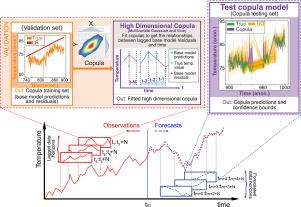Temperature measurement uncertainty quantification in condition monitoring of critical infrastructure using complex timeseries dependency modeling
引用次数: 0
Abstract
Maintenance interventions are required to keep power generation component temperatures within prescribed guidelines but come with the consequence of lost generation days. Understanding temperature increases caused by asset aging processes is critical to maintain safe operation but avoid needless maintenance. This is particularly important when power plants are approaching the end of their planned operational lifetime and may not operate as efficiently, eroding generation revenue margins. Temperature measurements, in many cases the earliest indicators of performance degradation, can be subject to a variety of uncertainty and noise stemming from plant configuration, sensor calibration changes and the general variability of component aging processes. The capability to provide confidence bounds on the predicted temperatures in the presence of measurement noise can permit maintenance decisions to be made with sufficient certainty on lead time to select the best course of maintenance action, given operational or financial constraints. This paper presents an approach for identifying the rate at which mechanical component temperatures can increase over a given operational horizon and presents a predictive distribution of the predictive error that may result from that estimate. A framework utilizing the dependency structure between propagated measurement and modeling uncertainty is developed through investigating a series of increasingly detailed Copula-based approaches applied to the residuals from data-based predictive models. The contribution is demonstrated on operational power generation data as well as stylized exemplar data.

基于复杂时间序列依赖模型的关键基础设施状态监测温度测量不确定度量化
为了使发电部件的温度保持在规定的指导范围内,需要进行维护干预,但随之而来的后果是损失了发电天数。了解由资产老化过程引起的温度升高对于维护安全运行至关重要,同时避免不必要的维护。当发电厂接近其计划运行寿命的终点时,这一点尤其重要,因为发电厂的运行效率可能会下降,从而侵蚀发电利润。在许多情况下,温度测量是性能退化的最早指标,它可能受到各种不确定性和噪声的影响,这些不确定性和噪声来自工厂配置、传感器校准变化和部件老化过程的一般可变性。在存在测量噪声的情况下,对预测温度提供置信范围的能力,可以在考虑运营或财务限制的情况下,在提前期做出足够确定的维护决策,从而选择最佳的维护行动方案。本文提出了一种确定机械部件温度在给定操作范围内可能增加的速率的方法,并提出了该估计可能导致的预测误差的预测分布。通过研究一系列应用于基于数据的预测模型残差的越来越详细的基于copula的方法,开发了一个利用传播测量和建模不确定性之间依赖结构的框架。在运行发电数据和程式化范例数据上证明了这一贡献。
本文章由计算机程序翻译,如有差异,请以英文原文为准。
求助全文
约1分钟内获得全文
求助全文

 求助内容:
求助内容: 应助结果提醒方式:
应助结果提醒方式:


